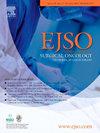Sentinel lymph node biopsy in apparently early-stage ovarian cancer: beyond removal of green nodes and surgical experience
IF 2.9
2区 医学
Q2 ONCOLOGY
引用次数: 0
Abstract
Background
Systematic pelvic and para-aortic lymphadenectomy is the standard procedure for surgical staging in apparently early-stage ovarian cancer. The role of sentinel lymph node biopsy remains unclear.
Objective
To evaluate the diagnostic accuracy, feasibility, and safety of sentinel lymph node biopsy when performed by a single operator with a standardized technique.
Methods
Case series of 36 patients with apparently early-stage ovarian cancer who underwent surgery performed by a single operator following the SELLY trial protocol. Sentinel lymph node mapping was performed by injecting the tracer into the infundibulopelvic and utero-ovarian ligaments. Sentinel node biopsy was followed by systematic pelvic and para-aortic lymphadenectomy.
Results
Thirty-six consecutive patients with apparently early-stage ovarian cancer were enrolled; 22 patients underwent immediate surgery and 14 delayed procedures after incidental diagnosis. 86.1 % of patients had successful mapping of at least one SLN, and 54.8 % had successful mapping in both pelvic and para-aortic regions. Three patients had isolated tumor cells (ITCs) and one patient had macro-metastasis in SLN. No cases of false negative SLN were observed. The sensitivity and negative predictive value were 100 %. We had five (13.9 %) postoperative complications not related to the SLN procedure itself.
Conclusion
SLN is a reliable and safe surgical procedure in apparent early-stage ovarian cancer regardless of immediate and delayed surgery, but strict protocol adherence and expert surgeons are mandatory. SLN mapping in apparent early-stage ovarian cancer is feasible and accurate in detecting lymph node metastasis.
早期卵巢癌前哨淋巴结活检:除绿淋巴结切除和手术经验外
背景:系统盆腔和主动脉旁淋巴结切除术是早期卵巢癌手术分期的标准程序。前哨淋巴结活检的作用尚不清楚。目的评价单一操作人员采用标准化技术进行前哨淋巴结活检诊断的准确性、可行性和安全性。方法36例明显早期卵巢癌患者,采用SELLY试验方案,由一名手术医师进行手术。通过将示踪剂注射到骨盆和子宫卵巢韧带中进行前哨淋巴结定位。前哨淋巴结活检后系统盆腔和腹主动脉旁淋巴结切除术。结果连续纳入36例明显早期卵巢癌患者;22例患者在意外诊断后立即手术,14例延迟手术。86.1%的患者成功定位了至少一个SLN, 54.8%的患者成功定位了骨盆和主动脉旁区域。3例患者有分离的肿瘤细胞(ITCs), 1例患者有SLN的大转移。未见SLN假阴性病例。敏感性为100%,阴性预测值为100%。我们有5例(13.9%)术后并发症与SLN手术本身无关。结论sln是一种可靠、安全的治疗早期卵巢癌的手术方法,无论立即或延迟手术,但必须严格遵守手术方案并由专家进行手术。SLN定位在早期明显卵巢癌中检测淋巴结转移是可行和准确的。
本文章由计算机程序翻译,如有差异,请以英文原文为准。
求助全文
约1分钟内获得全文
求助全文
来源期刊

Ejso
医学-外科
CiteScore
6.40
自引率
2.60%
发文量
1148
审稿时长
41 days
期刊介绍:
JSO - European Journal of Surgical Oncology ("the Journal of Cancer Surgery") is the Official Journal of the European Society of Surgical Oncology and BASO ~ the Association for Cancer Surgery.
The EJSO aims to advance surgical oncology research and practice through the publication of original research articles, review articles, editorials, debates and correspondence.
 求助内容:
求助内容: 应助结果提醒方式:
应助结果提醒方式:


